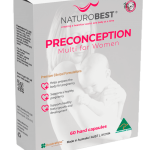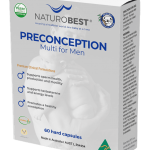Folate is a vitamin that is often recommended for fertility and pregnancy. It is included in many multivitamins for preconception and pregnancy support or it can be purchased as a stand alone vitamin.
What is folate and why is folate important?
Folate is the umbrella term for vitamin B9. It is involved in many important chemical reaction in body such as DNA production, cell growth, red blood cells production and foetus development.
Studies have shown the taking folate can reduce the risk of some birth defects such as spina bifida (1). Spina bifida is the maldevelopment of the spine and spinal cord during foetal time.
Folate is a vitamin that comes in different forms and so it is important to know which one you should take.
What is the best from of folate?
Folate is found naturally in foods such as leafy greens, broccoli, spinach, legumes, and fruit. When it enters the digestive tracts, dietary folate is converted to the active form of vitamin B9 – methyltetrahydrofolate (5-MTHF) before releasing into blood stream (2).
 Folic acid is the synthetic form of folate. It is the most commonly seen form in supplements. Different to dietary folate, folic acid is metabolised by liver and other tissues in the body (3). Unfortunately the process is slow and inefficient, leading to an accumulation of un-metabolised folic acid in the body. In particular in people with the MTHFR gene mutation, folic acid will not be metabolised efficiently.
Folic acid is the synthetic form of folate. It is the most commonly seen form in supplements. Different to dietary folate, folic acid is metabolised by liver and other tissues in the body (3). Unfortunately the process is slow and inefficient, leading to an accumulation of un-metabolised folic acid in the body. In particular in people with the MTHFR gene mutation, folic acid will not be metabolised efficiently.
Some studies have shown that chronic build up of un-metabolised folic acid can lead to several problems. It can mask vitamin B12 deficiency so that it goes undetected. Vitamin B12 deficiency during pregnancy may increase the risk of neural tube defect and other complications (4).
Many supplements contain folic acid and instead of that being good for you and protecting you from birth defects, it actually may have adverse health effects.
The better supplements contain an activated form of folate, called folinic acid or methylfolate. This is the precursor to 5-MTHF and it is much easier for the body to metabolise this. Taking folinic acid or methylfolate means that the body is able to convert and absorb and it actually provides the benefits folate is known for, it can reduce birth defects.
In summary: make sure your multi-vitamins contain activated folate in the form of folinic acid or methylfolate.
Which brand of multi-vitamins contains the right form of folate?
At Natural Solutions Acupuncture we love using the Naturobest brand because they are high quality supplements with activated forms of folate.


(1) Czeizel, A., Dudás, I., Vereczkey, A. and Bánhidy, F., 2013. Folate Deficiency and Folic Acid Supplementation: The Prevention of Neural-Tube Defects and Congenital Heart Defects. Nutrients, 5(11), pp.4760-4775.
(2) Patanwala, I., King, M., Barrett, D., Rose, J., Jackson, R., Hudson, M., Philo, M., Dainty, J., Wright, A., Finglas, P. and Jones, D., 2014. Folic acid handling by the human gut: implications for food fortification and supplementation. The American Journal of Clinical Nutrition, 100(2), pp.593-599.
(3) Wright, A., Dainty, J. and Finglas, P., 2007. Folic acid metabolism in human subjects revisited: potential implications for proposed mandatory folic acid fortification in the UK. British Journal of Nutrition, 98(04).
(4) Molloy, A., Kirke, P., Brody, L., Scott, J. and Mills, J., 2008. Effects of Folate and Vitamin B12Deficiencies During Pregnancy on Fetal, Infant, and Child Development. Food and Nutrition Bulletin, 29(2_suppl1), pp.S101-S111.

